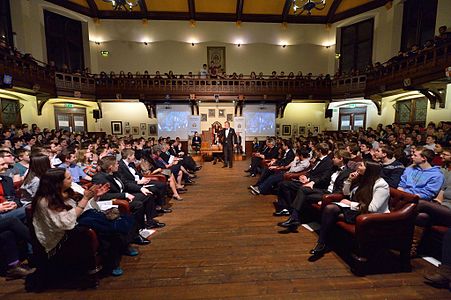
Cambridge Union
The Cambridge Union Society, also known as the Cambridge Union, is a debating and free speech society in Cambridge, England, and the largest society in the University of Cambridge. The society was founded in 1815 and is the second oldest continuously running debating society in the world, behind the University of St Andrews Union Debating Society.[1][2] Additionally, the Cambridge Union has served as a model for the foundation of similar societies at several other prominent universities, including the Oxford Union and the Yale Political Union. The Union is a private society with membership open to all students of Cambridge University and Anglia Ruskin University. The Cambridge Union is a registered charity and is completely separate from the Cambridge University Students' Union.
Not to be confused with Cambridge Students' Union.The Cambridge Union has a long and extensive tradition of hosting prominent figures from all areas of public life in its chamber, both state- and international-based, including the Dalai Lama, President Ronald Reagan, Bill Gates, Stephen Hawking, Prime Ministers Winston Churchill, Margaret Thatcher and John Major, presidential candidate Bernie Sanders, as well as comedian Stephen Fry.[3] Previous presidents of the Cambridge Union have included author Arianna Huffington and economist John Maynard Keynes.
Recordings and streaming[edit]
YouTube[edit]
On 9 May 2011, the Union launched its online public video service CUS-Connect, whereby recordings of past events and interviews were uploaded for free viewing. These have since been transferred the Union's YouTube channel titled 'The Cambridge Union'.[36] Before 2014, the Union only occasionally live-streamed popular events, with the first ever live stream held on 12 May 2011, in which Stephen Fry debated Radio 1 DJ Kissy Sell Out on the motion: "This House believes that classical music is irrelevant to today's youth".
Members' streaming service[edit]
As part of its bicentennial celebrations in 2015, the Union launched a permanent live streaming service, to be integrated with a new automatic multi-camera rig in the Main Chamber. The new service includes the ability for "virtual" attendees to contribute to debates via questions and comments to be read out on the floor of the Union. The streaming service is hosted on the Union's website and is available only to members.[37]
Controversy[edit]
Hosting of speakers[edit]
The Cambridge Union, like its Oxford counterpart, has faced controversy over its choice of speakers. Protests have been arranged by students against the appearance of Universities Minister David Willetts, Government Minister Eric Pickles,[38] during which the building was broken into, former IMF chief Dominique Strauss-Kahn, French politician Marine Le Pen[39] and Wikileaks Founder Julian Assange.[40] In January 2015, the hosting of Germaine Greer caused a public row between the Union and the Cambridge Students' Union's LGBT+ group, due to Greer's alleged transmisogyny towards Rachael Padman.
[41] In June 2019, the hosting of Malaysian Prime Minister Mahathir Mohamad attracted criticism from the Union of Jewish Students, the Board of Deputies of British Jews, and several former Cambridge Union members including former President Adam Cannon due to the former's anti-Semitic remarks.[42][43][44][45] In February 2022, the Union hosted the Israel ambassador Tzipi Hotovely in a high-security, balloted event, resulting in protests and minor vandalism of the premises.[46]
Responding to these criticisms, the Union is often quoted as upholding the universal right to free speech, against the principles of No Platform passed by the National Union of Students and upheld by a few groups within Cambridge.[47][48][49]
2015 Counter-Terrorism Bill[edit]
Lobbying by former Union Presidents Lord Deben and Lord Lamont resulted in the specific exclusion of the Cambridge and Oxford Unions from the Government's counter-terrorism bill, amid fears it could restrict free debate. Deben argued that the provisions within the bill would have prevented the hosting of British Union of Fascists' leader Oswald Mosley in the 1950s, concluding that the bill threatened "an essential British value".[50] The National Union of Students used the exclusion to argue that the passage of the Bill was too rapid and ill-thought out, whilst both the Oxford and Cambridge Union reaffirmed that they were not legally part of their respective Universities and thus were never subject to the bill in the first place.[51]
Strong opposition to the bill from Liberal Democrats and senior Conservative peers eventually resulted in the shelving of provisions regarding Universities' until after the 2015 General Election.[52] The Counter Terrorism and Security Act 2015 eventually clarified that higher education institutions must retain particular regard to the duty to ensure freedom of speech and the importance of academic freedom within university societies,[53] although it is unclear whether this applies to the Union.
Referendum on Julian Assange[edit]
The union called a referendum on the hosting of Julian Assange on 22 October 2015, arguing that his residency in the Ecuadorian Embassy meant he was outside the jurisdiction of UK law, and thus required the consultation of its members considering a lack of past precedent. The referendum was more widely viewed as an opinion poll on the union's refusal to "no platform" speakers.[54] It passed with 76.9% of the vote. Turnout was 1463.[54]


